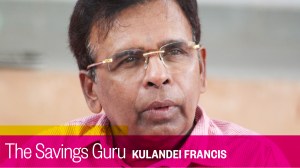In this series

Years ago, I toured as an opening act for Rich Mullins. There was something about Rich's music that stirred up people's deepest longings. I loved overhearing conversations at the autograph table; they often turned serious and urgent.
More than once, a fan asked Rich how to discern the will of God. Rich would listen, and then offer an unexpected perspective.
"I don't think finding God's plan for you has to be complicated," he'd begin. "God's will is that you love him with all your heart and soul and mind, and also that you love your neighbor as yourself. Get busy with that, and then, if God wants you to do something unusual, he'll take care of it. Say, for example, he wants you to go to Egypt." Rich would pause for a moment before flashing his trademark grin. "If that's the case, he'll provide 11 jealous brothers, and they'll sell you into slavery."
I'm not sure whether this satisfied Rich's fans, but I suspect his advice has stayed with them in the way it's haunted me. When I find myself wrestling with life decisions, I think of Rich's Egypt Principle. It makes me laugh, and then it asks me to get down to the serious business of determining which of my options allow me to best love God and other people. Such an approach usually rules out certain possibilities, while affirming (and even creating) several others.
Sometimes, once I've narrowed down my alternatives in light of the Great Commandment, the determinative "jealous brothers" do show up. A scholarship comes through at one school and not another. A job offer is escalated or rescinded. Other times, however, I'm left standing at the junction of several seemingly reasonable pathways, miserable with uncertainty. If only Rich were around to dispatch further wisdom!
Recently, in a college music department faculty meeting, the topic of discerning God's will came up. We were discussing the decisions our students face, which often include whether to pursue a music career or enter church ministry. One teacher mentioned that he asks students to attend to their experiences of consolation and desolation. They should give special consideration to the directions that most consistently produce consolation, he said, while the avenues that create desolation should be approached cautiously.
I was skeptical. If some of our students are led into music careers, desolation (rejection, obstacles, long drives in decrepit vans) will be normative. (I imagine the desolation level in church ministry is similar.) Often, the most worthwhile undertakings are the most difficult. Christians, as people of the Cross, should understand this best. Wouldn't a paradigm of consolation and desolation lead to avoiding anything challenging or unpleasant?
While I teach at one college, I'm a graduate student at another. There, only a few weeks later, I re-encountered the consolation/desolation paradigm in some coursework on Ignatian spirituality. I began to realize that I had misunderstood these terms. Consolation is understood not as happy feelings (although they can be its byproduct), but rather as that which opens us up to God and others—and quickens our pulse for the things of the kingdom. Even difficult circumstances can lead to consolation if we sense God in them. Desolation, too, is more nuanced than I imagined. It has to do with that which distracts us from our awareness of God's presence and turns us in on ourselves (whether our immediate experience of the diversion is positive or negative).
Ignatian spiritual direction reminds us that diligent attention to the movements of consolation and desolation in our own souls can help clarify which options lie within God's will. In moments of crisis, we can base our decisions both upon how we have sensed him moving, and also upon the God-given inclinations we've discovered within ourselves.
I'm not certain whether Rich Mullins was familiar with Ignatian spirituality. But I know he paid attention to the things that opened him up to God—and the things God seemed to have wired him to love—and ran headlong toward them. That's how he ended up traveling with a ragamuffin band of friends, singing songs that made people hungry to find God's will. It's also how he wound up, toward the end of his short but ferociously lived life, on a Navajo reservation, teaching music to kids.
Maybe that's why Rich could claim that loving God and others takes care of most of our discernment questions. After all, the psalmist assures us that if we delight ourselves in the Lord, he will give us the desires of our heart (Ps. 37:4). God can be trusted to teach our hearts what to desire, and to lead us—by jealous brothers, burning bushes, or quiet inclinations—to the places where our own unique giftings meet the movements of his kingdom. There we find consolation … and joy.































